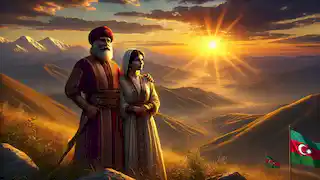The Epic of Köroğlu
Reading time: 11 min
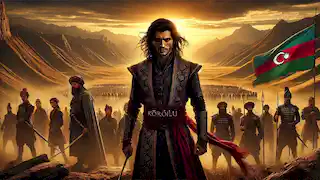
About this story: The Epic of Köroğlu is a Legend from Azerbaijan set in the Medieval This Dramatic tale explores themes of Justice and is suitable for All Ages. It offers Inspirational insights. A tale of courage and justice in the face of tyranny.
In the heart of Azerbaijan, a land where mountains pierce the sky and rivers weave their way through vast, fertile plains, a legend took root. This legend is known as the Epic of Köroğlu, a tale that has been passed down through the generations, carried by the winds that sweep across the land and whispered in the songs of wandering minstrels. Köroğlu, whose name means "Son of the Blind Man," was more than just a hero; he was a symbol of the fight against oppression, a beacon of hope for the downtrodden, and a champion of justice.
The story of Köroğlu begins with his father, a master horse trainer named Ali Kişi. Ali Kişi was in the service of a powerful bey, a lord who was known for his cruelty and insatiable greed. The bey, obsessed with the idea of possessing the finest horses in the land, heard rumors of a legendary stallion. This horse was said to be unmatched in speed, strength, and spirit—a creature of unparalleled beauty and power. Eager to add this prize to his collection, the bey ordered Ali Kişi to train the horse and prepare it for him.
Ali Kişi, renowned for his skill, took on the task with dedication. However, the stallion was wild and untamable, with a spirit that could not be broken. Days turned into weeks, and despite Ali Kişi's best efforts, the horse remained as wild as ever. The bey, impatient and furious, accused Ali Kişi of incompetence and sabotage. In a fit of rage, the bey ordered that Ali Kişi be blinded, leaving him to live out the rest of his days in darkness.
When Köroğlu, then a young man, learned of his father's fate, he was consumed with a fiery desire for revenge. The injustice done to his father became the catalyst for his transformation from a mere youth into a legendary hero. Köroğlu vowed to bring justice to those who had wronged his father and to protect the weak from the tyranny of the powerful. He left his home and took to the mountains, where he gathered a band of loyal followers—men who had also suffered under the hands of the beys and lords, men who yearned for a world where justice prevailed.
From his mountain stronghold, Köroğlu waged a relentless war against the oppressors of the land. He and his followers became known as freedom fighters, striking fear into the hearts of the wealthy and powerful. Köroğlu's name became synonymous with resistance and justice, a name that the poor and downtrodden whispered with hope and reverence.
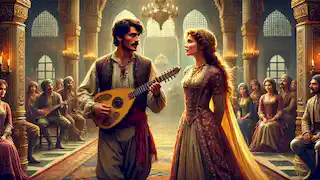
One of the most famous tales from Köroğlu's life is his encounter with a beautiful and brave maiden named Nigar. Nigar was the daughter of a powerful bey, known far and wide for her beauty and intelligence. When Köroğlu heard of her, he was captivated by the stories of her strength and grace, and he resolved to meet her. Disguised as a wandering minstrel, Köroğlu made his way to the palace of Nigar's father. There, under the guise of a simple singer, he sang songs of love, heroism, and the fight for justice, enchanting all who heard him with his voice and the tales he spun.
Nigar, too, was drawn to the mysterious minstrel. She listened intently to his songs, sensing the passion and resolve behind his words. As their eyes met across the crowded hall, a silent understanding passed between them. Nigar recognized in Köroğlu a kindred spirit, a man who would not be bound by the chains of oppression, and her heart was stirred by a mixture of admiration and love.
However, their love was not to be an easy one. Nigar's father had promised her hand to a suitor—a cruel and ruthless man who viewed Nigar as nothing more than a trophy to be won. This man, driven by jealousy and greed, sought to possess Nigar by any means necessary. When Köroğlu revealed his true identity and his love for Nigar, the stakes were raised. Nigar knew that if she stayed, she would be forced into a loveless marriage, living under the control of a man who would never understand or respect her. She made the difficult decision to flee with Köroğlu, to leave behind the life of luxury she had known and embrace the uncertain future that awaited them in the mountains.
In the dead of night, under the cover of darkness, Köroğlu and Nigar made their escape. They rode swiftly across the plains, their horses galloping like the wind, as they headed towards the safety of Köroğlu's mountain stronghold. But their escape did not go unnoticed. Nigar's suitor, enraged by her betrayal, gathered a band of men and set out in pursuit. What followed was a harrowing chase, a race for freedom that would become one of the most legendary tales in Azerbaijani folklore.
Through narrow mountain passes and across raging rivers, Köroğlu and Nigar fled from their pursuers. Time and again, they narrowly escaped capture, thanks to Köroğlu's unmatched knowledge of the terrain and his cunning strategies. Finally, after days of pursuit, they reached the safety of Köroğlu's fortress. There, surrounded by his loyal followers, Köroğlu and Nigar found a moment of peace. Their love blossomed, and Nigar became not only Köroğlu's beloved but also his most trusted advisor and ally.
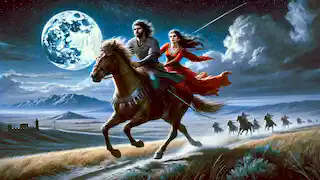
Köroğlu's fame continued to spread far and wide. His deeds were recounted in songs and stories, and his name became a symbol of hope for those who had suffered under the yoke of oppression. The poor and downtrodden looked to Köroğlu as a savior, while the rich and powerful viewed him as a threat to their way of life. The beys and lords of Azerbaijan, unable to defeat Köroğlu in open battle, resorted to more insidious means. They spread rumors of discord among his followers, hoping to sow seeds of doubt and mistrust, to weaken Köroğlu's influence from within.
But Köroğlu, wise beyond his years, saw through their schemes. He called his followers together and spoke to them with the fire and passion that had made him a leader. He reminded them of the oath they had sworn—to fight for justice, to protect the weak, and to stand against tyranny. His words reignited their spirits, and they vowed to remain united, to continue their fight for a better world.
One of the most significant events in Köroğlu's life was the Battle of Mount Ararat. By this time, Köroğlu's raids on the caravans and fortresses of the beys had become so successful and so feared that the beys decided to join forces to bring an end to his rebellion. They assembled a massive army, an overwhelming force that they believed would finally crush Köroğlu and his followers. The army marched towards Köroğlu's stronghold, confident in their superior numbers and weaponry.
Köroğlu, however, was not one to be easily intimidated. He prepared his men for the coming battle, knowing that this would be the greatest challenge they had ever faced. As the enemy army approached, Köroğlu devised a daring plan. He led his men in a nighttime raid on the enemy camp, striking with the speed and precision of a falcon. The attack threw the enemy into chaos, as Köroğlu and his men struck at the heart of their forces, causing confusion and panic.
The battle raged throughout the night, with neither side willing to yield. Köroğlu fought with the strength of a lion, inspiring his men to fight with all their might. The beys' forces, though greater in number, were no match for the resolve and unity of Köroğlu's followers. By the time the first light of dawn touched the peaks of Mount Ararat, it was clear that Köroğlu had won the day. The enemy army, demoralized and defeated, retreated, leaving behind a battlefield strewn with the remnants of their shattered forces.
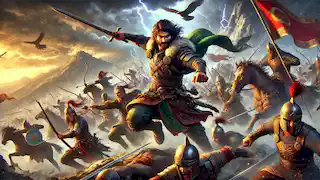
The victory at Mount Ararat was a turning point in Köroğlu's struggle. It cemented his reputation as a leader of unparalleled courage and wisdom, a man who could stand against overwhelming odds and emerge victorious. His name was sung in every village and town, and the story of the battle became a rallying cry for those who longed for freedom. Köroğlu's legend grew, and with it, his influence over the people of Azerbaijan.
However, Köroğlu's journey was far from over. The final chapter of his quest for justice involved a confrontation with the bey who had blinded his father—the man whose cruelty had set Köroğlu on his path of vengeance. This bey had always been in the back of Köroğlu's mind, a constant reminder of the pain and suffering that had shaped his life. Köroğlu knew that he could not rest until he had faced this man and brought him to justice.
Köroğlu and his men set out on a perilous journey to the bey's palace, knowing that this final battle would be the most difficult of all. The palace was a fortress, heavily guarded and seemingly impregnable. But Köroğlu was not deterred. He devised a plan to infiltrate the palace under the cover of darkness, using his knowledge of the land and his cunning to outmaneuver the guards.
As they entered the palace, Köroğlu's thoughts were consumed with the memories of his father—of the man who had once been strong and proud, but who had been reduced to a life of darkness by the bey's cruelty. When Köroğlu finally came face to face with the bey, he was struck by how much
the man had aged. The bey, once feared and powerful, was now old and frail, a shadow of his former self. But despite his physical decline, the bey's cruelty and arrogance had not diminished.
Köroğlu confronted the bey, his voice filled with the righteous anger of years of suffering and loss. He spoke of the pain that his father had endured, of the injustice that had been done, and of the many lives that had been ruined by the bey's greed and cruelty. The bey, defiant to the end, refused to show any remorse. He believed that his power and wealth would protect him, that he would remain untouchable.
But Köroğlu was not there to seek revenge through violence. He was there to deliver justice. He could have easily taken the bey's life, but instead, he chose a different path. Köroğlu spared the bey, leaving him to live out his remaining days in the knowledge that he had been defeated not by force, but by the strength of Köroğlu's character and the power of justice. The bey, now stripped of his power and influence, was left to reflect on the consequences of his actions, a broken man in a crumbling palace.
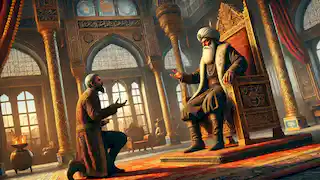
With the bey's defeat, Köroğlu's quest for justice was complete. He had avenged his father, freed the oppressed, and brought a measure of peace to the land. But Köroğlu knew that his work was not done. The world was still full of injustice, and as long as there were people who needed his help, Köroğlu would continue to fight. He returned to the mountains, where he and Nigar lived out their days, leading their people with wisdom, compassion, and a sense of unwavering justice.
The Epic of Köroğlu is not just a story of one man's quest for vengeance; it is a tale of the eternal struggle between good and evil, a story that speaks to the hearts of all who hear it. It is a reminder that even in the face of overwhelming odds, justice and righteousness can prevail. Köroğlu's legacy lives on in the songs and stories of Azerbaijan, a testament to the enduring power of courage, love, and the unyielding pursuit of justice.
As the sun sets over the mountains of Azerbaijan, casting long shadows across the land, the story of Köroğlu continues to inspire. It is a story that will never fade, a beacon of light in a world that often seems to be consumed by darkness. And as long as there are those who are willing to stand up for what is right, Köroğlu's spirit will live on, a symbol of the eternal struggle for freedom, justice, and the hope that one day, the world will be a better place for all.
